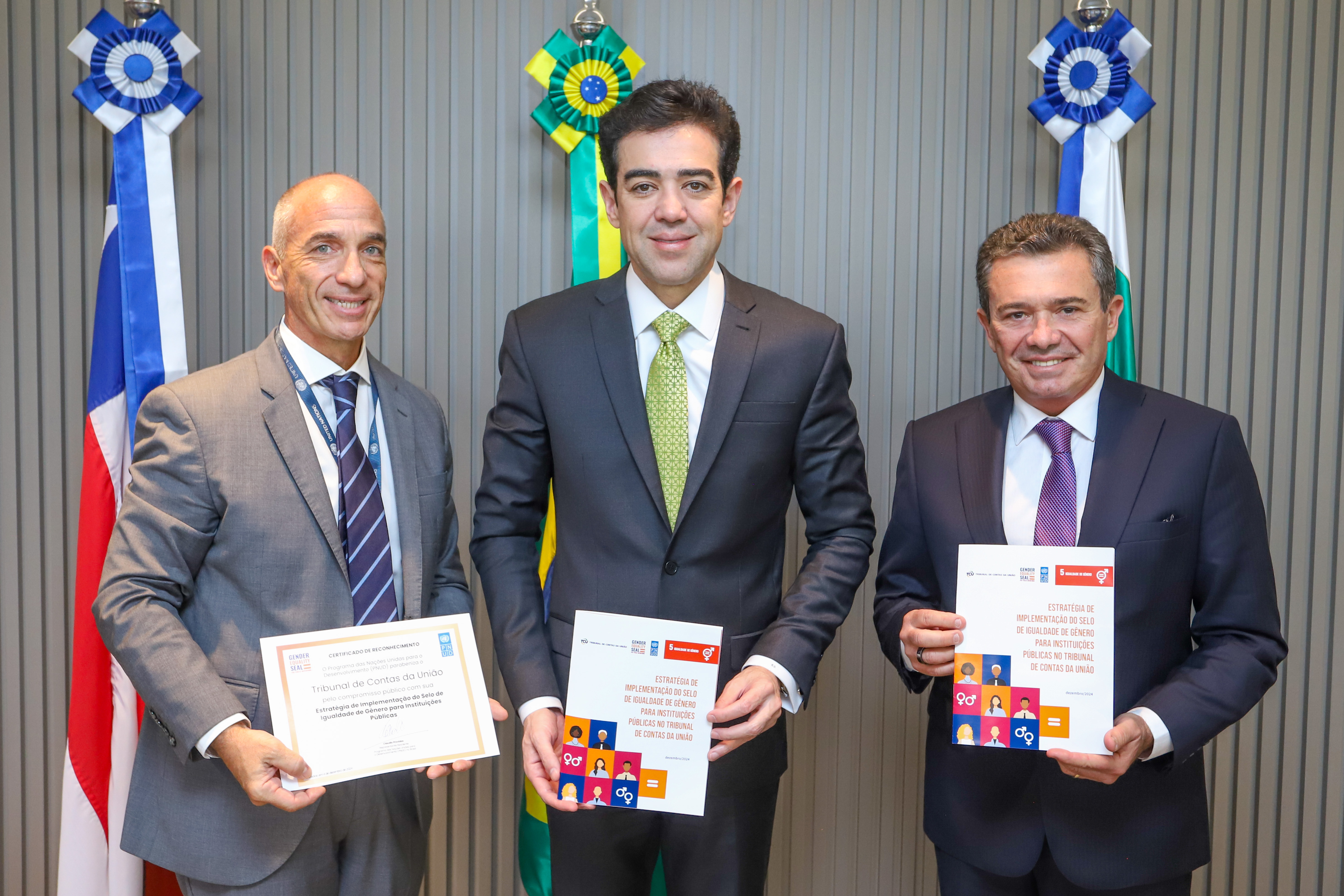TCU Advances in Promoting Equality and Receives UNDP Certification
United Nations Development Programme Recognizes the Court’s Public Commitment to Gender Equality
Por Secom

On December 4, the Brazilian Federal Court of Accounts (TCU) received a certificate of recognition from the United Nations Development Programme (UNDP) for its public commitment to promoting gender equality in its activities and management. The recognition followed the presentation of the “Implementation Strategy for the Gender Equality Seal for Public Institutions at TCU.”
Claudio Providas, the UNDP Representative in Brazil, presented the certificate to Minister Bruno Dantas, President of the Court, and Minister Vital do Rêgo, Vice-President of the TCU. The document acknowledges the progress made by the Court toward achieving gender equity. This certification is awarded when an institution completes its action plan to meet the standards set by the seal’s methodology. The recognition marks the first step in pursuing the Gender Equality Seal. “When I learned about the seal, I was immediately motivated to pursue it. We have already begun internal initiatives, but we are aware that the process is lengthy. Our goal is to continue this work during the next administration,” Dantas emphasized.
The decision to pursue the seal is part of the TCU's strategy to strengthen its operations and enhance its international standing, aiming to promote sustainable human development. As the Chair of INTOSAI (International Organization of Supreme Audit Institutions), TCU signed a technical cooperation agreement with the UNDP in 2023.
Claudio Providas highlighted the significance of recognizing TCU's advancements in equity initiatives. “The seal is not merely a stamp; it is a tool with a comprehensive approach encompassing various dimensions. It represents an evolving process where institutions commit to implementing and maintaining a series of management, training, education, and communication actions to ensure gender equity and measure tangible progress. Even in the initial diagnostic phase, the TCU demonstrated exceptional commitment and implemented measures above the average," Providas emphasized.
Marcela Timóteo, coordinator of TCU's Technical Committee on Equity, Diversity, and Inclusion, explained that the next step to obtaining the seal is implementing the action plan developed in collaboration with various units within the Court.
“This effort requires engagement across the entire Court, as the plan includes more than 70 actions to be carried out throughout 2025 and up to March 2026. So far, we have met 34% of the seal’s criteria. After the implementation period, an external evaluation team accredited by UNDP will assess whether we are eligible to receive the seal. This analysis process lasts about three months and is expected to be completed by May 2026,” Timóteo explained.
Participants

Representing the TCU at the meeting were the Secretary-General of Administration, Márcio Albuquerque; the Deputy Secretary-General of Administration, Fabiana Ruas; Chief of Staff of the Presidency, Elaine Souza; Secretary for External Control of Sustainable Development, Vanessa Lopes; Secretary-General of External Control, Junnius Arifa; Secretary for International Relations, Simone Bambini; Senior Consultant for the Seal Project, Vivian Souza; External Control Auditor, Cristiane Schunig; and Director-General of the Serzedello Corrêa Institute for Capacity Building (ISC), Adriano Cesar.
Andrea Bolzon, UNDP Brazil's Coordinator for Governance and Justice for Development, also attended the event.
Gender Equality at the Court of Accounts
The TCU has been investing in promoting gender equality both in its administrative context and in its audit activities. One initiative was the issuance of TCU Ordinance 67/2023, which regulates the appointment of leadership roles at strategic and tactical levels within the Court. The aim is to maintain gender proportionality. This year, the strategy was expanded with the implementation of a dashboard that allows real-time monitoring of the ordinance’s provisions.
Gender Equality Seal
The UNDP Gender Equality Seal for Public Institutions symbolizes recognition of institutions that demonstrate an effective commitment to promoting gender equality in their internal practices and organizational structures, as well as in their policies and operations. The seal aligns with Sustainable Development Goal (SDG) 5, which addresses gender equality, and SDG 16, which focuses on effective, accountable, and inclusive institutions. GB